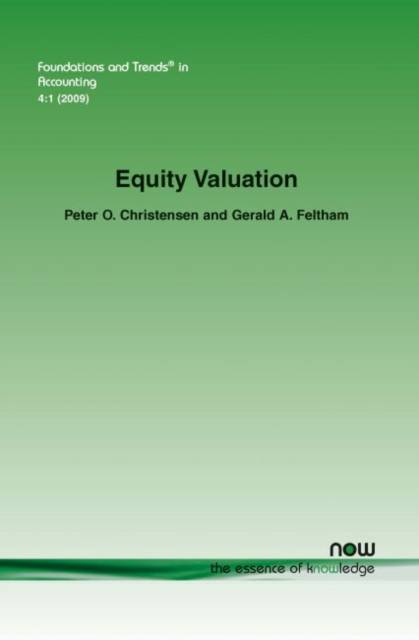
- Afhalen na 1 uur in een winkel met voorraad
- Gratis thuislevering in België vanaf € 30
- Ruim aanbod met 7 miljoen producten
- Afhalen na 1 uur in een winkel met voorraad
- Gratis thuislevering in België vanaf € 30
- Ruim aanbod met 7 miljoen producten
Zoeken
Omschrijving
Equity Valuation reviews and critically examines the standard approach to equity valuation using a constant risk-adjusted cost of capital and develops a new valuation approach discounting risk-adjusted fundamentals using nominal zero-coupon interest rates. Equity Valuation is organized as follows. Chapter 2 (Risk-adjusted Discount Rates) reviews standard valuation models based on risk-adjusted discount rates. Chapter 3 (Multi-period Asset Pricing Theory and Accounting Relations) examines key results from multi-period asset pricing theory in discrete-time, and shows how equity valuation models can equivalently be based on free cash flows or accrual accounting numbers. Based on these results, the authors derive an accounting-based multi-period equity valuation model presented in Chapter 4 (An Accounting-based Multi-period Equity Valuation Model) with equilibrium risk-adjustments determined by prices of aggregate consumption claims. Chapter 5 (Equity Valuation with HARA Utility) includes a general equilibrium analysis of a setting in which the investors have HARA utility, and aggregate consumption and residual operating income are jointly normally distributed. A set of appendices follows including Appendix B that extends the setting to preferences with external habit formation (which recently has gained popularity in asset pricing theory), and Appendix C, which discusses the relationship between risk-adjusted expected cash flows and certainty equivalents.
Specificaties
Betrokkenen
- Auteur(s):
- Uitgeverij:
Inhoud
- Aantal bladzijden:
- 126
- Taal:
- Engels
- Reeks:
- Reeksnummer:
- nr. 11
Eigenschappen
- Productcode (EAN):
- 9781601982728
- Verschijningsdatum:
- 21/10/2009
- Uitvoering:
- Paperback
- Formaat:
- Trade paperback (VS)
- Afmetingen:
- 156 mm x 234 mm
- Gewicht:
- 185 g

Alleen bij Standaard Boekhandel
+ 209 punten op je klantenkaart van Standaard Boekhandel
Beoordelingen
We publiceren alleen reviews die voldoen aan de voorwaarden voor reviews. Bekijk onze voorwaarden voor reviews.











